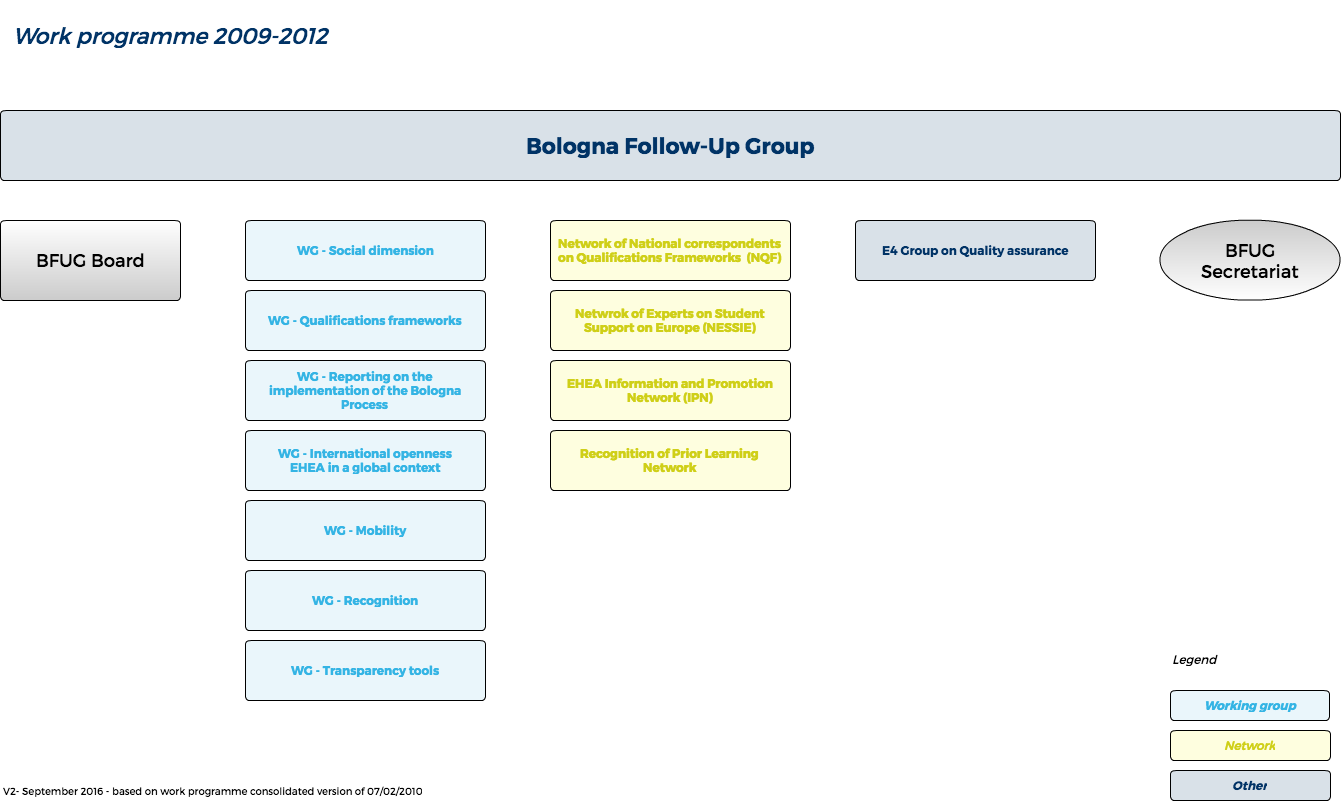Work programme 2009-2012
The European Higher Education Area
In the decade up to 2020 European higher education has a vital contribution to make in realising a Europe of knowledge that is highly creative and innovative... Europe can only succeed in this endeavour if it maximises the talents and capacities of all its citizens and fully engages in lifelong learning as well as in widening participation in higher education.
Ministers responsible for Higher Education in the countries participating in the Bologna Process,
Leuven/Louvain-la-Neuve Communiqué, April 2009
Key issues
In the Leuven/Louvain-la-Neuve Communiqué, the Ministers responsible for higher education in the countries participating in the Bologna Process identified the following higher education priorities for the coming decade
- social dimension: equitable access and completion,
- lifelong learning;
- employability;
- student-centred learning and the teaching mission of higher education;
- education, research and innovation;
- international openness;
- mobility;
- data collection;
- multidimensional transparency tools;
- funding.
Continued actions
The E4 Group on Quality Assurance (ENQA, ESU, EUA, EURASHE) was asked to continue its cooperation in further developing the European dimension of quality assurance and to ensure that the European Quality Assurance Register is evaluated externally, taking into account the views of the stakeholders.
The work on the independent assessment of the Bologna Process launched in the previous period continued until 2010 and the final results were presented at the Ministerial Conference, Budapest, 11 March 2010.
Bologna Follow-Up Group
For the short term, the Ministers therefore entrusted the BFUG
to prepare a work plan up to 2012 to take forward the priorities identified in this Communiqué and the recommendations of the reports submitted to this Ministerial conference, allowing the future integration of the outcome of the independent assessment of the Bologna Process.
In particular the BFUG is asked:
- To define the indicators used for measuring and monitoring mobility and the social dimension in conjunction with the data collection;
- To consider how balanced mobility could be achieved within the EHEA;
- To monitor the development of the transparency mechanisms and to report back to the 2012 ministerial conference;
- To set up a network, making optimal use of existing structures, for better information on and promotion of the Bologna Process outside
the EHEA; - To follow-up on the recommendations of analysis of the national action plans on recognition.
Leuven/Louvain-la-Neuve Communiqué, par. 26 2009 Leuven Louvain-la-Neuve Communiqué - English
Working Groups
To implement the Bologna reforms and to make progress in all priority areas, strong efforts will be required especially at national and institutional level. To support these efforts with joint action at European level, the Ministers entrusted the Bologna Follow-up Group to prepare a work plan for the period leading up to the Ministerial Conference in 2012, including the Ministerial Anniversary Conference on 11-12 March 2010 in Budapest and Vienna.

Bologna Work Programme 2009-2012
As part of the 2009-2012 work plan, the Bologna Follow-up Group set up seven working groups on the following topics:
- Social Dimension
- Qualifications Frameworks and Network of National Correspondents on Qualifications Frameworks
- International Openness and EHEA Information and Promotion Network
- Mobility and Network of Experts on Student Support in Europe (NESSIE)
- Recognition and Recognition of Prior Learning Network
- Reporting on the implementation of the Bologna Process
- Transparency mechanisms
To further disseminate the Bologna reforms, countries and organisations participating in the Bologna Process also organise various seminars and conferences.
